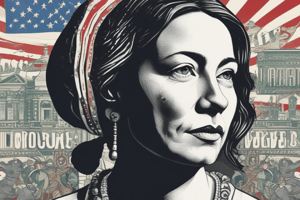Podcast
Questions and Answers
What is politics?
What is politics?
The set of activities associated with making decisions in groups or other forms of power relations among individuals.
Who is considered the father of modern political science?
Who is considered the father of modern political science?
Niccolò Machiavelli
Aristotle claimed that politics is the study of laws of the city.
Aristotle claimed that politics is the study of laws of the city.
True (A)
What does governance refer to?
What does governance refer to?
What does 'participatory' mean in the context of governance?
What does 'participatory' mean in the context of governance?
Which of the following is NOT one of the 5 types of power?
Which of the following is NOT one of the 5 types of power?
The study of the relations of states with each other is known as __________.
The study of the relations of states with each other is known as __________.
What is the role of political ideology?
What is the role of political ideology?
Match the following forms of government with their descriptions:
Match the following forms of government with their descriptions:
Study Notes
Politics and Governance
- Politics originates from the Greek word 'politika', meaning 'affairs of the cities'; it encompasses decision-making activities in groups and power relations.
- Governance refers to the act of governing a group of people or a state, emphasizing the roles of authority and responsibility.
Political Science
- This social science discipline focuses on the study of political systems, behavior, and theories, addressing key concepts in politics.
Key Political Theorists
- Niccolò Machiavelli, known as the Father of modern political science, authored "The Prince," exploring power dynamics and political strategy.
- Aristotle, another foundational figure, considered politics as the study of city laws and citizen actions.
- Plato emphasized justice as fair treatment, framing unjust actions as unfair.
Subfields of Political Science
- Political Theory investigates philosophical ideas underpinning political systems.
- Comparative Politics analyzes different countries' political structures and behaviors.
Political Structures
- Governance types include:
- Monarchy: Rule by a king or queen.
- Tyranny: Absolute power held by a single ruler.
- Aristocracy: Government by elite individuals.
- Oligarchy: Rule by a few, typically privileged.
- Democracy: Governance where all citizens have voting rights.
- Polity: Representative government structure.
- Timocracy: Governance based on wealth and property ownership.
Principles of Governance
- Participatory governance encourages active involvement of all stakeholders in decision-making.
- Rule of Law requires citizens to respect and obey laws consistently.
- Effective and Efficient governance fulfills societal needs through functioning institutions and transparent processes.
- Transparency means accessibility to decision-making information and processes.
- Responsiveness mandates that institutions serve all stakeholders timely and appropriately.
- Equity and Inclusiveness advocate for considering all society members, especially the vulnerable.
Consensus and Accountability
- Consensus-oriented governance involves decision-making that considers diverse perspectives.
- Accountability relates to the responsibility individuals or groups have regarding their actions and decisions.
Importance of Government
- Governments maintain peace and order, protect people and property, administer justice, promote education, and ensure state security.
International Relations
- This area studies interactions among states and international organizations, highlighting collaboration and unity.
Ideology
- Political ideologies are coherent belief systems that inform organized political practices and theories.
- Liberalism prioritizes individual fulfillment and rights.
Social Contract Theory
- Thomas Hobbes (1588-1679) posited that individuals yield some freedom to a controlling authority for order and safety.
- John Locke (1632-1704) promoted limited government, emphasizing natural rights and the social contract that protects these rights.
Power Dynamics
- Five types of power include:
- Coercive Power: Controlling individuals through threats or force.
- Thought Control: Manipulation of an individual's cognitive processes for influence.
Studying That Suits You
Use AI to generate personalized quizzes and flashcards to suit your learning preferences.
Related Documents
Description
This quiz explores the fundamental concepts of politics, including governance and the role of individuals in decision-making processes. It covers the importance of participation in political systems and the dynamics of power relations. Test your understanding of political terminology and theories.





